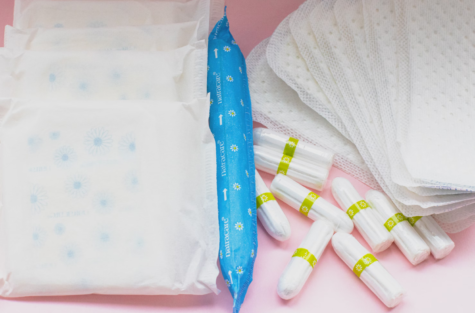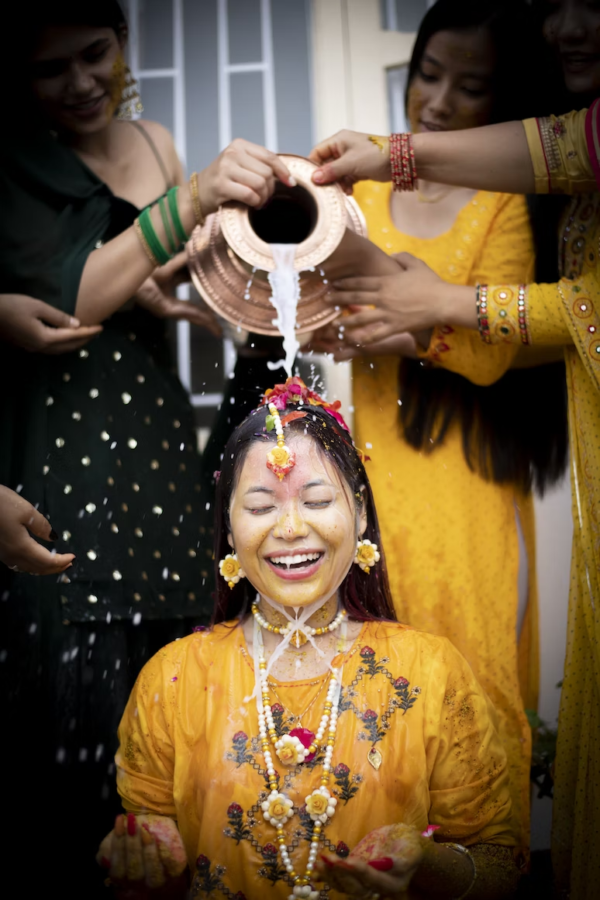An Everlasting Stigma: Periods
Although our world has developed and embraced many things in the past few decades, one topic remains a taboo: the menstrual cycle.
Traditions like washing the body after applying turmeric are some of the rituals followed during period ceremonies in India and Nepal.
Stigma is like a disease, drowning its victims in its sea of malaise. The effects of stigma can be difficult and destructive. With stigma comes incomprehension from those around an individual, which may be invalidating and uncomfortable, but stigma also carries more severe outcomes which includes fueling anxiety, rage, and a negative attitude directed at other people.
The concept of menstruation is one such topic that leads to stigma. The natural process is often misunderstood and poorly taught all over the world, leading to said stigma. Finding one person in a crowd of people who can properly state facts about menstruation is rare. You would be surprised as to how many people are not even able to state the duration of a period.
The period stigma can have overarching impacts on other aspects of a girl’s life, including her education. In the United States, girls in public school often receive information on menstruation around fifth grade, receive feminine hygiene products, and receive some sort of education about sexual health. Contrast this with some developing countries where menstruation is not publicly addressed, or where girls on their period are forced to miss school due to limited access to feminine products or unjust attitudes about menstruation. For example, across Africa it is estimated that one in ten girls will miss school when they have their periods, and can miss approximately 10-20% of school days – which can lead to them dropping out altogether. This puts them at greater risk for child marriage, and getting pregnant at a younger age, which in turn comes with heightened health risks.
Not receiving a full education and being forced into an early marriage also can inevitably lead to a reduced capacity to access employment, a terrible consequence which only further serves to hold back women’s life chances.
Menstrual health education is nonexistent in some parts of the world that are considered underdeveloped. Where it does exist, it often begins later in a young person’s life, and in some cases, even after girls have begun their first period. The result of not educating girls about menstruation before it starts means that their initial reaction is likely to involve fear, shame and embarrassment.
Additionally, poor period education means a lack of knowledge around what menstrual hygiene products are out there. As a result, many women, girls, and people do not have control over the products they use, and do not have the ability to dispose of or clean these products in an appropriate manner. Some sexual education programs do not even cover menstrual health, or exclude boys from taking part. This takes away the opportunity to tackle period stigma at an early age.

Women in societies where period education does not exist face society shutting them out during their periods. In Venezuela, many women are forced to sleep in huts for the duration of their menstruation. In rural Ghana, menstruating women are forbidden from entering a house with a man or cooking food. Many young women don’t have access to any type of sanitary pad, which can cause them to miss school and cause them to be 70% more likely to have reproductive tract infections. A 2014 study in Nairobi’s Mathare Valley slum found that over 75% of girls had no idea what menstruation was before they got their first period. This caused them to feel anxious, confused and ashamed about their periods.
In Nepal the tradition of Chhaupadi , despite its ban, is still practiced in some rural areas. The tradition is that when someone is on their period, they’re sent to a shed or hut because they’re considered impure and even unlucky. Although it’s not as common anymore, the idea of impurity continues to exist. When a woman is nauchune meaning “untouchable,” she’s not allowed to cook, touch other people, or pray. Similar practices in Bangladesh exist where girls and women on their periods are also excluded from these same activities.
Around India, there are also many myths related to menstruation. The main restrictions in rural areas are not being able to enter the puja room, which is the most sacred part of the house used for worship, and not entering the kitchen. In another study, women claimed that the smell coming from their bodies during menstruation could turn preserved food bad and consequently aren’t allowed to touch sour foods like pickles. In some cultures, women bury the clothes they use instead of pads so they can’t be used by evil spirits. The myths even suggest that period blood is dangerous, or if a person menstruating touches a cow, it will become infertile.
These myths can be dispelled with basic science. Societies need education about menstruation so these ideas can disappear and stop negatively impacting womens’ health. Israth Tayiba ’26 agreed when she said, “The importance of basic science is more than just receiving an education. Rather it is about safety and the quality of life a woman experiences.”
Specifically in India, there is a state called Assam where a girl’s first menstruation is considered worthy of celebration, and a grand wedding is held. Tuloni biya or Xoru Biya (small wedding) is celebrated by the Assamese. Before the seventh day of her first period, invitations are sent to family and friends for the wedding ‘reception.’ On this day, the girl is treated as a bride and a feast is organized to let society know that she has transformed into a woman.
So, this is a tradition that actually celebrates womanhood and menstruation one may think. However, it is not as beautiful as it sounds. In fact, the rituals in the lead-up to the ‘wedding’ actually reveal the age-old belief of menstruation as a taboo. When a girl experiences her first period, she is ushered into a small section of the house where the male members cannot see her. A formal discussion follows regarding her having attained puberty and the restrictions. For the next seven days, she is limited to a particular corner of the house. She is required to fast for a few days and she is deprived of a bath for days. On the fourth day, as a process of ‘purification’, turmeric and sesame seed paste is smeared on her body.
The tuloni biya thus represents a contradiction of sorts. On the one hand, it is a celebration of menstruation and womanhood that attempts to break the stronghold of patriarchy. Yet, on the other hand, the restrictive rituals are actually dogmatic and a symbol of patriarchy nonetheless.
The constant shame leads to unhealthy practices. The stigma around periods means that quality menstrual products like pads are often not available or prioritized. This means that in low-income countries, menstrual products are seen as “luxury items,” which girls and women will often forgo so their families don’t have to cut back on other essential items, like food. Girls and women are instead forced to use unhygienic materials like old newspapers, rags, earth, sand, ash, grass or leaves, which are uncomfortable and can cause infections.
This means that in low-income countries, menstrual products are seen as “luxury items,” which girls and women will often forgo so their families don’t have to cut back on other essential items, like food.
Niha Roy is a Managing/Advisory Editor and a Staff Reporter for ‘The Science Survey.' She enjoys writing articles about issues and groups of people whom...

